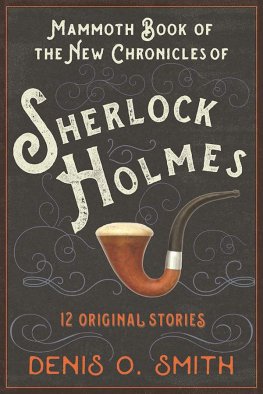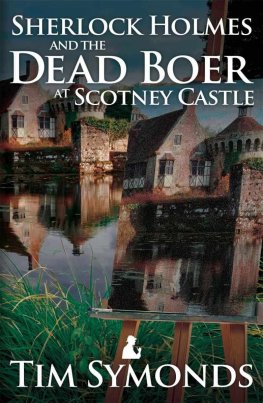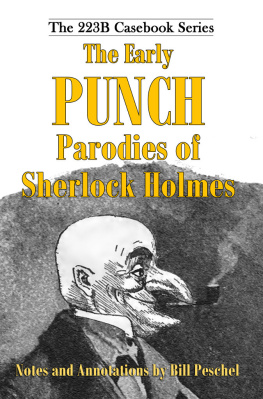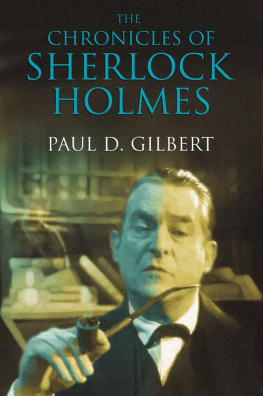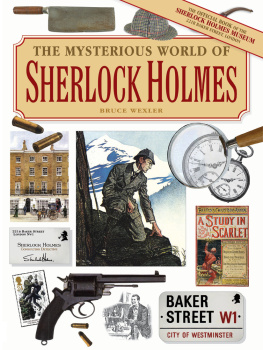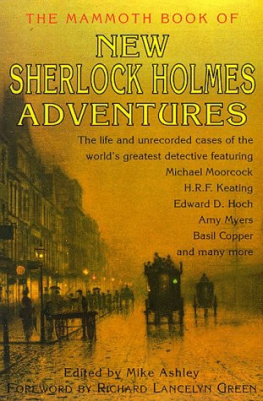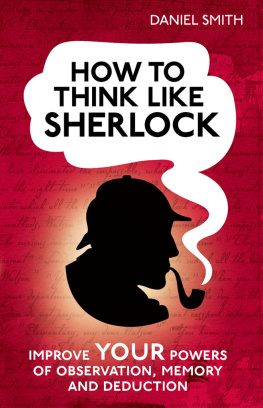Denis O. Smith
The Mammoth Book of the New Chronicles of Sherlock Holmes
12 Original Stories
The Adventure of the Black Owl
Mr Sherlock Holmes was undoubtedly an enthusiast, if a somewhat eccentric one. For some men, the discovery of a rare stamp or a broken fragment of ancient pottery is the occasion for joy approaching almost to ecstasy. For others, such joy comes from the chance discovery of an old, forgotten book, or a rare and dusty bottle of wine. For my friend, Sherlock Holmes, the worlds first consulting detective and a man of the most singular tastes, those things which aroused the greatest enthusiasm in his breast were crime and mystery. It should not be supposed, however, that his interest in such matters was at all sordid or sensationalist. Indeed, those crimes which tend to fill the front pages of the more lurid newspapers were generally among the least interesting to him. Whether the crime had been marked by violence, or had involved any celebrated public figures, these facts were perfectly immaterial to Holmess interest. For what he valued most highly was the mystery with which crimes are so often enveloped, and the more impenetrable the mystery, the more my friends interest and enthusiasm were aroused.
Fortunately for Holmess taste in these matters, he had, at the time of which I am writing, achieved a certain celebrity in the solution of mysteries, criminal and otherwise, and it was thus rarely necessary for him to actively seek out the conundrums which would give his brain the exercise it craved, for any mystery worthy of the name would almost inevitably be brought to his attention sooner or later. Thus it was in the case of the Holly Grove Mystery, a crime which, as readers may recall, shocked the whole of London. One or two of the daily papers had carried a brief report of the matter on the morning following the murder, and a day later they were all full of it, but Holmes, who had been closely engaged in other work, had passed no comment. When I tried to interest him in the matter, he rebuffed my efforts, and it was clear that he did not regard it as likely to offer any opportunity for the exercise of those analytical powers for which he was renowned. His opinion was to change, however, following a visit that evening from our old friend, Inspector Gregson of Scotland Yard.
Our supper concluded, the remnants had been cleared away and we had settled to our evening reading, mine a treatise on diseases of the nervous system, Holmess a report he had received from Dublin on a case which interested him, when there came a sharp tug at the front-door bell. A moment later, Inspector Gregson was shown into the room.
Ah! Gregson! said Holmes in an affable tone, as he brought another chair up to the fireside for the policeman. What brings you here this evening, I wonder? Surely not more difficulty with the Kensington forgery case?
No, that was straightforward enough, after you put me on the right track, Mr Holmes. Yes, I will have a whisky and soda, Dr Watson that is very civil of you. My problem now, he continued as I passed him the glass, concerns the Highgate murder. No doubt you have read something of it in the paper, Mr Holmes?
Dr Watson read me a brief account earlier. A shocking business, no doubt, but it did not strike me as possessing any great features of interest.
So I thought, too, when I began my inquiries, responded the policeman. However, he continued, taking a sip of his drink, it has taken one or two turns in the complicated direction, if you know what I mean.
Oh? said Holmes with interest. Perhaps you could describe it to us.
With pleasure. I am very keen to know what you make of it.
Very well, then, said Holmes, leaning back in his chair and closing his eyes. You have my full attention. Begin at the beginning, as if we know nothing of the matter, and omit no detail known to you, however trivial it may seem.
In the first place, said Gregson after a moment, you ought to know something of the dead mans household. It is soon described, for it is not a large one. Professor Humphrey Arbuthnot and his wife, who did not have any children, have lived at the house in Holly Grove, Highgate, for more than twenty-five years and are both fairly advanced in age now. Professor Arbuthnot used to be the most famous medical psychologist in London, but retired from practice about ten years ago, since which time he and his wife have lived a quiet, secluded sort of life. Indeed, the professor, who has been in poor health for some time, had scarcely left the house in the past ten years. The wants of this elderly couple have been few, and their domestic staff has accordingly never amounted to more than a cook and two maids at the most. At the moment, since one of the maids left their employment at the end of July, it is not even that, but amounts to just two, a cook, Mary Cartwick, who has been with them for eight years, and, as general housemaid, a young girl by the name of Ruby Parrish, who came to them about six months ago.
The house itself is a substantial, double-fronted one. A short, straight path, of perhaps twenty yards, connects the garden gate to the front door. On the left of the door is the dining-room, and on the right a drawing-room. The garden, which contains some very big trees, and is thus rather shady, continues round the right-hand side of the house. There, towards the back of the house, there is a pair of French windows to the professors study. It was in this room that the crime took place, the evening before last.
Were the French windows open at the time? queried Holmes, without opening his eyes.
Yes, they were, but there was nothing unusual about that. It seems it was the professors habit to have the windows open whenever he was working in the study, even in the evening. He was a man who liked fresh air, so I am told, and, being round the side of the house, it was, of course, perfectly private. On the day in question, he had, apart from a short break for lunch, been working in the study all day, and had not left the house.
I see. Pray, continue!
The Arbuthnots did very little entertaining and had not had anyone to dinner for a year or more, but on the evening in question they were expecting two dinner guests. The first of these was an old colleague of Professor Arbuthnots, Dr Ludwig Zyss. He now makes his home in Vienna, but is at present visiting London, staying at the Belvedere Hotel on Southampton Row. The second was Professor Arbuthnots sister, Lady Boothby, whose late husband, as you may recall, was under-secretary at the foreign office some years ago. Apparently, Lady Boothby rarely goes out these days and it was only because Dr Zyss was to be there that she had agreed to attend the dinner. The history of these two men, Arbuthnot and Zyss, is an interesting one. Some years ago, they had a joint medical practice in Harley Street, which was renowned throughout Europe, so I am told, but they fell out quite badly about a dozen years ago and subsequently went their separate ways, Dr Zyss returning to his native Austria. This did not, however, end the dispute or ill-feeling between them, for although the two men never met again, nor communicated with each other in any way, they pursued their quarrel for several years in the pages of various learned journals, and neither, so I am informed, ever missed an opportunity to vilify the other. Thus the fact that Dr Zyss had an appointment to call upon Professor Arbuthnot on Wednesday evening is somewhat surprising. One can only presume it was an attempt to bury their differences, let bygones be bygones, and so on. That seems to be the general belief. My information is that Dr Zyss, who is about the same age as Professor Arbuthnot, is also not in the best of health, and may not be long for this world, so it may be that he wished to effect a reconciliation with his old colleague before it was too late for such things.

